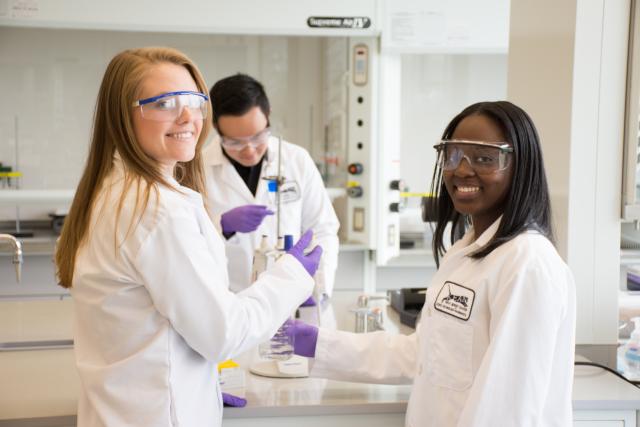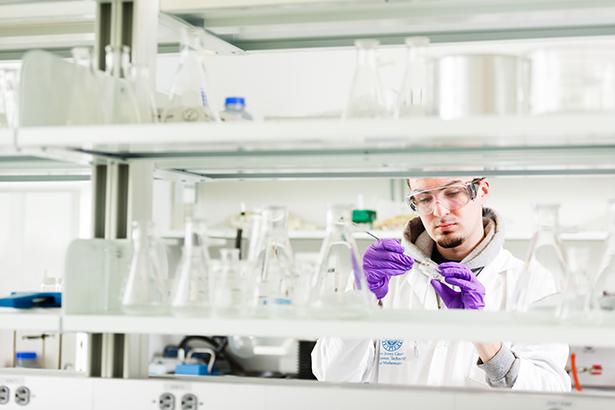
Mentors in STEM Research Program (MSRP)
About Us

The Mentors in STEM Research Program (MSRP) promotes active mentoring opportunities in direct support of student research. The Program provides experienced researchers, many of whom have had successful careers in industry and have made important contributions to science, an academic environment to pursue their research interests in partnership with undergraduate and graduate students in one or more of the University’s research offerings, including: the Research First Initiative (STME 2903 Research Experience and STME 3903 Advanced Research Experience), Independent Research (STME 4901, 4902 and 4903, and MS Biotechnology Sciences thesis research (STME 5411, 5413 and 555). These scientists are bestowed the title “MSRP Fellow” and hold adjunct research faculty appointments at Kean. They have expressed a strong interest in mentoring students, advancing research together, and supporting students as they move forward in their science careers.
Our Mission

The mission of the MSRP is to promote experiential teaching and learning at Kean by engaging students in multidisciplinary, collaborative research projects that are led by exceptional scientists who are or have been active outside of a traditional academic research setting. These scientists offer our students real-world perspectives on how to construct a successful research career outside of academia, whether in governmental laboratories, in non-profit institutes, or in companies aligned with biotechnology, pharmaceutical science, finance, computation, and healthcare industries, to name just a few.
We are committed to training the next generation of scientists through workforce development programs, academic-industrial research partnerships and other activities that provide students with both the practical skills and the mindset to succeed in technical fields. This type of preparation will allow them to enter the workforce ready to solve the world’s most pressing scientific and societal challenges.
Spotlight
MSRP Fellow Dr. Gerald Bills
About Dr. Bills: Gerald Bills has been a member of research teams that discovered some of the most significant fungal natural products of the past three decades. From 1988 until 2008, he worked at Merck Research Laboratories in the USA and Spain where he established new strategies for generating fungal and other microbial metabolites for drug discovery. Before returning to the USA in 2012, he served as the head of Microbiology at the Fundación MEDINA, Granada, Spain (2009-2012), an institute devoted to the discovery of antiinfective and therapeutic agents from microbial metabolites. He has also been a professor in the Institute of Molecular Medicine, University of Texas Health Science at Houston and, more recently, a visiting scientist in the Department of Plant Biology, Rutgers University.
His research interests include how and why fungi produce bioactive natural products to deliver molecules that can intervene in human diseases and infections. For example, his lab has characterized the biosynthesis of pneumocandin B0, the starting molecule for the antifungal drug, Cancidas (Caspofungine), and has worked on reprogramming pneumocandin biosynthesis to produce new derivatives with improved potency, spectrum and pharmacokinetics. His lab has also identified the biosynthetic pathway for enfumafungin, the starting natural product for the clinical candidate, Ibrexifungerp. He received his PhD in mycology/botany from Virginia Tech, Blacksburg, Virginia, USA. He is Fellow of the Mycological Society of America.
About Dr. Bills’s Research Stream at Kean: Microbial Biobanks for Applications in Biotechnology, Pharmaceuticals, Food and Agricultural Sciences
Microbial processes are fundamental to all forms of life, and humans have exploited these processes for foods and medicines since the dawn of civilization. Microbial biobanks are essential living biological infrastructure that support many industries and basic sciences. Living examples of microbial strains are stored in biobanks to enable the diagnoses and treatment of human, animal and plant diseases, prevention of biodeterioration and microbial toxins, development of industrial catalysts, and construction of bioengineered microbial cell factories. Students engage in hands-on training to learn the practical and employable skills needed to construct, maintain, and validate a microbial biobank.
This research focuses on yeasts and fungi as model organisms for microbial biobanks because these organisms are ubiquitous and relatively easy to cultivate and grow at a scale appropriate for the desired production. Students explore the fungi and yeasts of specific habitats of their choosing. They learn how separate these organisms from their habitat, choose the physiological and nutritional conditions that best support their growth, and identify the organisms by microscopy and molecular diagnostics. They also learn quality control and cryopreservation methods for long-term storage and databases for storing relevant data on each strain. Finally, depending on the kinds of organisms, students have opportunities for exploring potential uses of their organisms for applications in medicine, plant diseases control, plant growth, fermented foods and beverages, edible fungi, biodeterioration, and other applications. This research stream is especially relevant to students seeking careers in chemical, life, and health sciences. The students emerge with a portfolio of first-hand experiences and skills that can enhance future employment prospects and their ability to address questions related to the presence of microorganisms in natural and man-made situations.